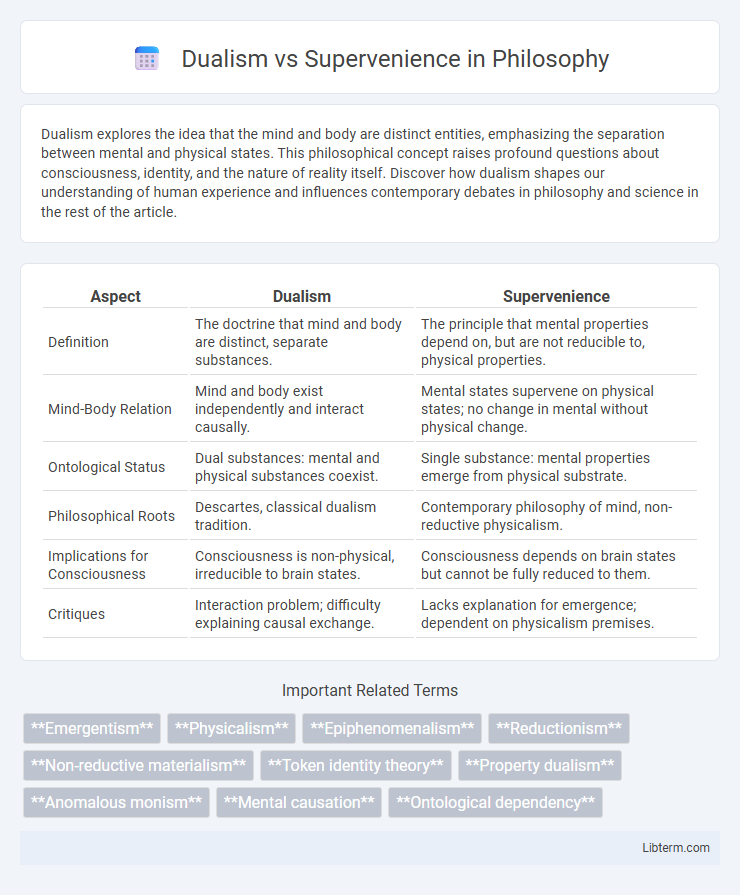Dualism explores the idea that the mind and body are distinct entities, emphasizing the separation between mental and physical states. This philosophical concept raises profound questions about consciousness, identity, and the nature of reality itself. Discover how dualism shapes our understanding of human experience and influences contemporary debates in philosophy and science in the rest of the article.
Table of Comparison
| Aspect | Dualism | Supervenience |
|---|---|---|
| Definition | The doctrine that mind and body are distinct, separate substances. | The principle that mental properties depend on, but are not reducible to, physical properties. |
| Mind-Body Relation | Mind and body exist independently and interact causally. | Mental states supervene on physical states; no change in mental without physical change. |
| Ontological Status | Dual substances: mental and physical substances coexist. | Single substance: mental properties emerge from physical substrate. |
| Philosophical Roots | Descartes, classical dualism tradition. | Contemporary philosophy of mind, non-reductive physicalism. |
| Implications for Consciousness | Consciousness is non-physical, irreducible to brain states. | Consciousness depends on brain states but cannot be fully reduced to them. |
| Critiques | Interaction problem; difficulty explaining causal exchange. | Lacks explanation for emergence; dependent on physicalism premises. |
Introduction to Mind-Body Theories
Dualism posits that the mind and body are fundamentally distinct substances, often characterized as res cogitans (thinking substance) and res extensa (extended substance), emphasizing a clear ontological divide between mental and physical realms. Supervenience, by contrast, asserts that mental states depend systematically on physical states such that no mental change occurs without corresponding physical change, aligning with non-reductive physicalism. These mind-body theories address the relationship between consciousness and brain processes, influencing debates on mental causation and the nature of subjective experience.
Defining Dualism: Core Principles
Dualism asserts that mind and body are fundamentally distinct substances, with the mind representing non-physical mental states and the body encompassing physical processes. Core principles include the separation of consciousness from material matter and the belief that mental phenomena cannot be fully explained by physical interactions alone. This metaphysical stance contrasts with physicalist theories by emphasizing the independent existence of mental properties.
Understanding Supervenience in Philosophy
Supervenience in philosophy describes a relationship where higher-level properties depend on, or are determined by, lower-level physical states without reducing them entirely, contrasting with Dualism's strict separation of mind and body. This concept helps explain how mental states can consistently correlate with physical brain states while maintaining a form of ontological dependence. Understanding supervenience provides a framework for addressing the mind-body problem by emphasizing dependency without invoking dualist substance distinctions.
Historical Origins: Dualism vs Supervenience
Dualism originates in ancient philosophy, prominently advocated by Rene Descartes in the 17th century, positing a fundamental distinction between mind and body as separate substances. Supervenience emerged in 20th-century analytic philosophy, particularly through the work of Donald Davidson and others, describing a dependency relation where mental states supervene on physical states without ontological separation. The historical origins mark a shift from substance dualism's metaphysical separation to supervenience's focus on systematic dependency and property relations in philosophy of mind.
Key Differences Between Dualism and Supervenience
Dualism posits two fundamentally distinct substances: mind and body, with the mind existing independently from the physical realm. Supervenience, by contrast, holds that mental states depend on or are determined by physical states, without invoking a separate substance. The key difference lies in dualism's ontological separation, whereas supervenience emphasizes dependence and correlation between mental and physical properties.
Arguments Supporting Dualism
Arguments supporting dualism emphasize the irreducibility of mental states to physical processes, asserting that consciousness possesses non-physical properties that cannot be fully explained by brain activity. Philosophical cases such as the knowledge argument and the argument from qualia highlight the experiential aspects of mind that resist materialistic accounts. Furthermore, dualism addresses the explanatory gap by maintaining that mental phenomena supervene on, but are not identical to, physical states, preserving the distinct nature of mind and body.
Critiques of Dualism in Contemporary Philosophy
Critiques of dualism in contemporary philosophy emphasize its difficulty in explaining the interaction between mind and body, highlighting the lack of empirical evidence for non-physical substances. Supervenience offers a more scientifically grounded framework by positing that mental states depend on, and are determined by, physical states without invoking separate substances. This approach addresses dualism's challenges by maintaining a consistent ontology aligned with physicalism, avoiding issues of causal interaction and substance dualism.
The Appeal and Challenges of Supervenience
Supervenience appeals in philosophy of mind by providing a framework where mental states depend on physical states without reducing one to the other, preserving mental causation and autonomy. Challenges arise from defining the exact nature of dependency relations, addressing issues of multiple realizability, and ensuring explanatory adequacy in accounting for consciousness. This complex interplay highlights ongoing debates about the sufficiency of physical explanations for mental phenomena and the limits of non-reductive physicalism.
Dualism and Supervenience in Modern Science
Dualism, rooted in the philosophical tradition of Descartes, posits the existence of two distinct substances: mind and matter, challenging purely physical explanations of consciousness. Supervenience, a concept widely embraced in contemporary philosophy of mind, asserts that mental states depend on physical states without reducing the former entirely to the latter, aligning closely with physicalist and scientific perspectives. In modern science, supervenience serves as a framework for understanding the dependence of mental phenomena on neural processes, while dualism faces criticism for its lack of empirical testability and integration with neurobiological evidence.
Conclusion: Comparative Perspectives and Future Directions
Dualism and supervenience offer distinct frameworks for understanding mind-body relations, with dualism emphasizing a fundamental ontological separation and supervenience positing dependency without reduction. Comparative analysis reveals that supervenience provides a more scientifically tractable model compatible with physicalism, while dualism addresses metaphysical challenges of consciousness's irreducibility. Future research should integrate advances in neuroscience and philosophy of mind to refine these models, exploring hybrid approaches that accommodate both ontological depth and empirical coherence.
Dualism Infographic

 libterm.com
libterm.com